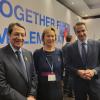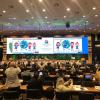Press Releases
Displaying Results 1 - 15 of 15
In response to the huge impacts on the environment of the war in Ukraine, the United Nations Economic Commission for Europe (UNECE) and partners including UNEP, OECD, UNDP, UNIDO, the World Bank and OSCE are joining forces though an inter-agency group to coordinate the assessment of environmental
Updated guidance published today by the United Nations Economic Commission for Europe (UNECE) will help governments to strengthen biodiversity monitoring as a basis for sharpened biodiversity protection policies across all sectors.
The guidance is the first of its kind to build on the historic
Environmental impact assessment (EIA) in a transboundary context, along with strategic environmental assessment (SEA), have an important role to play in climate proofing and in helping countries to achieve a sustainable and green post-COVID-19 economic recovery. EIA and SEA are also expected to be
The 18 countries in the Eastern Mediterranean and Middle East, which are home to some 450 million inhabitants, are particularly vulnerable to climate change. Under a “business as usual” scenario, they risk facing a 5°C increase in the mean annual temperature by the end of the century, which would
UNECE Executive Secretary Olga Algayerova was in Kyiv on Sunday 9 and Monday 10 October to meet with Government officials to discuss UNECE support to the reconstruction of Ukraine. Since the start of the war, upon official requests for assistance from the government, UNECE has been providing
The 9th Environment for Europe Ministerial Conference closed today in Nicosia, Cyprus, with the adoption of a ministerial declaration affirming countries’ commitment to transition to a green economy with sustainable infrastructure at its core.
The declaration also calls on countries to join and
New assessment reveals progress on air quality and protected areas, but calls for urgent action to tackle emissions, waste, pollution and biodiversity loss
A circular economy and sustainable infrastructure offer solutions
Despite progress in certain areas, governments in the pan-European
Environmental assessments are tools that benefit people and nature. Their use ensures the soundness and transparency of economic and territorial planning decisions, preventing damage to the environment and health from economic growth. The Republic of Moldova committed to apply strategic
Peacefully resolving the overriding political, economic and social concerns of our time requires a multifaceted approach. This includes mechanisms to address the links between the natural environment and human security. Building up on over a decade of successful cooperation, the partners of
Food waste, ecosystem services and green public procurement among pledged topics forming new Batumi Initiative on Green EconomyCountries and stakeholders from the pan-European region have today agreed on a roadmap to speed up the transition to a Green Economy between now and 2030 and made an
Poor air quality, climate change, unhealthy lifestyles and the disconnection between people and the environment are increasingly affecting human health in the region, finds the latest Global Environment Outlook (GEO-6) assessment for the pan-European region, prepared by UNEP and UNECE with
GenevaThe 7th “Environment for Europe” (EfE) Ministerial Conference, held in Astana from 21 to 23 September 2011, concluded on the commitment by the Governments of the UNECE region to take the lead in the transition to a green economy. The Conference gathered more than 1,500 participants, from
The 7th Ministerial Conference “Environment for Europe” will open on 21 September in Astana. More than 800 participants will discuss the two main themes for the Conference: Sustainable management of water and water-related ecosystems; and Greening the economy: mainstreaming the environment into
Geneva The Committee on Environmental Policy met in Geneva from 2 to 5 November 2010 to advance the preparations for the seventh “Environment for Europe” (EfE) Ministerial Conference, which will bring together ministers and representatives of civil society and business in Astana (Kazakhstan
Geneva The Extended Bureau of the UNECE Committee on Environmental Policy met on 16 and 17 March 2010 to further prepare the Seventh Ministerial Conference “Environment for Europe”. The “Environment for Europe” process and its Ministerial Conferences provide a high-level platform for








